 Mohammed Belkharraf • 1763 days ago • 18 min read
Mohammed Belkharraf • 1763 days ago • 18 min read
It's difficult to master SEO optimization, particularly if you're just getting started. Fortunately, discovering the best SEO resources is simple because we've compiled a list of them all. We polled over 30 SEO experts to find out which software is the best and which keyword tracking tools are the most common. You don't have to try all of these tools; all you have to do is find out which one is best for your business.
Why Use SEO Tools?
SEO tools relieve you of the time-consuming task of keyword study and data processing. You will see what's working and which aspects of your plan might use some tweaking with these methods. The best SEO tools will also offer you reports on how you compare to your rivals and where your biggest opportunities are. They also allow you to track search performance across countries, regions, and languages.
It will get better. If you manage several websites, SEO tools will help you evaluate the efficiency of each one on the fly. Many entrepreneurs who run several websites end up entering a lot of information into spreadsheets and manually analyzing it.
However, this quickly becomes daunting, increasing the likelihood of false news. Fortunately, SEO software can save you hours of work and produce reliable reports with a single click.
Best Search Engine Optimization (SEO) Tools
1. Ahrefs: SEO Keyword Tool
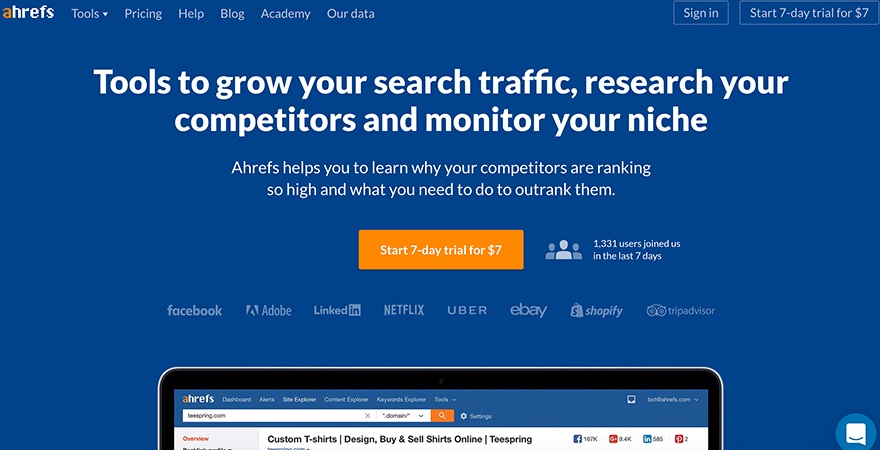
Ahrefs is one of the most popular SEO tools on the internet. When it comes to the biggest website crawlers, it is just second to Google. Ahrefs' Site Audit feature is the best SEO analysis tool available, and SEO experts can't get enough of it. The tool will show you which sections of your website need to be improved in order for it to rank higher in search engines. You'll most likely use Ahrefs to evaluate your competitor's backlinks in order to use them as a starting point for your own brand in a competitor study. This SEO tool can also be used to find the most linked to the content in your niche, review, and repair broke links on your website, and provide an overview of your top-performing sites.
Syed Irfan Ajmal, a Ridester Growth Marketing Manager, is a big fan of Ahrefs, an SEO keyword tool. “When it comes to various aspects of SEO such as keyword analysis, rank monitoring, competitor research, SEO audit, viral content research, and much more, Ahrefs is without a doubt our most favorite tool,” he says. We add our own platform as well as that of our rivals. The tool then displays the websites that refer to our competitors but not to us. This assists us in identifying excellent connection opportunities. But it wouldn't have been as easy if Ahrefs didn't have the world's largest backlink database. Ahrefs was crucial in having our site ranked for many big keywords and bringing in 350,000 monthly visitors."
2. Google Search Console: Top SEO Tool
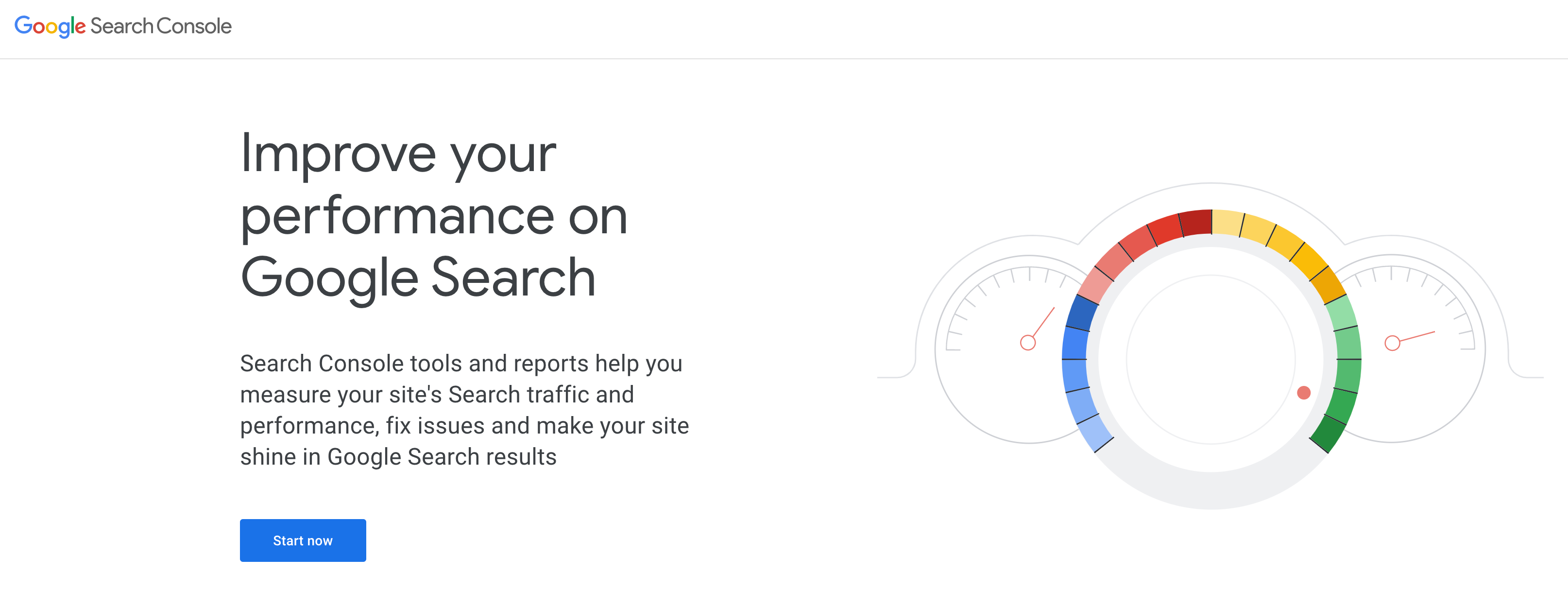
Google Search Console is a free tool that allows anyone with a website to track and report on their site's appearance in Google SERPs. Simply add a code to your website or go through Google Analytics to check your website before submitting your sitemap for indexing. While a Search Console account is not required to appear in Google's search results, you can use it to monitor what gets indexed and how your website is portrayed. Search Console can help you understand how Google and its users view your website and allow you to optimize for better success in Google search results as an SEO checker tool. It’s especially useful for new websites as it lets site owners submit web pages for search indexing.
3. SEMRush: Marketing SEO Tools
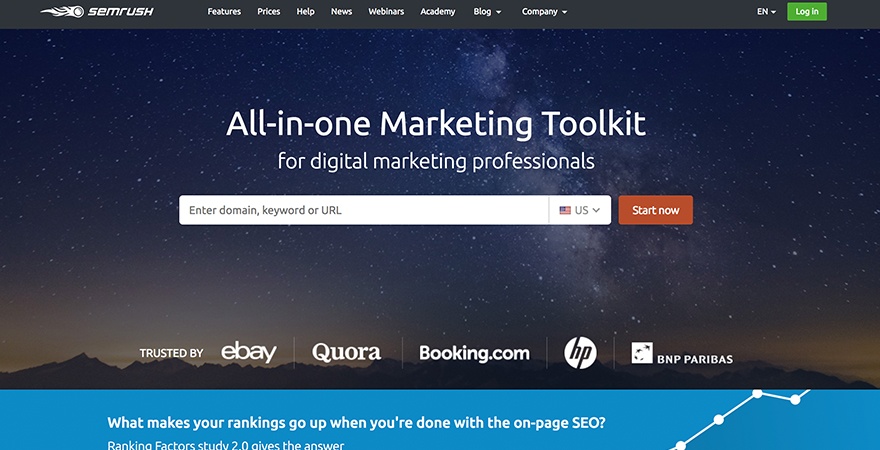
SEMRush and other marketing SEO tools are popular favorites among SEOs. Experts adore them because they make it easy to determine the rankings as well as spot shifts and new opportunities. The Domain Vs Domain analysis, which allows you to easily compare your website to your rivals, is one of the most common features of this SEO tool. You'll be able to compare keywords and domains if you're searching for analytics reports to help you better understand your website's search results, traffic, or even your competitors. The On-Page SEO Checker tool makes it simple to keep track of your rankings and get advice on how to boost your website's results.
SEMRush is one of the best SEO resources, according to Liraz Postan, Senior SEO & Content Manager at Outbrain. “My favorite SEO tool is SEMrush, which has a feature called "organic traffic insights," she says. This feature allows me to see all of my most popular posts in one place, along with related keywords, social shares, and word count. This provides me with a short rundown of what's working and where I should focus my efforts. I use SEMrush on a daily basis, and I adore this tool. I particularly enjoy using its site audit to improve the health of our website. Since we started using SEMrush, we've improved our site health by 100 percent and increased conversions from our content pages by 15%.”
4. KWFinder: SEO Keyword Tool
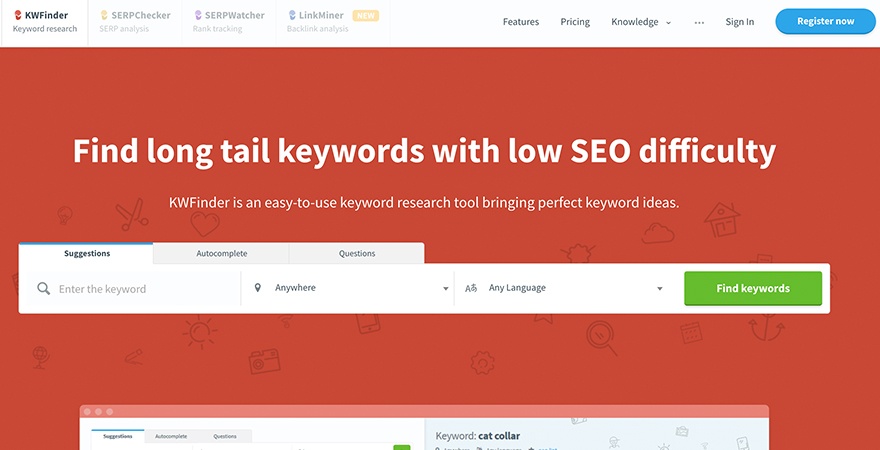
Long-tail keywords with low competition can be found using an SEO keyword tool like KWFinder. This SEO tool is used by experts to find the best keywords and generate backlink and SERP analysis reports (Search Engine Results Page). Their Rank Tracker tool makes determining your ranking and monitoring your progress based on a single metric easy. And, if that wasn't enough, you'll get a slew of new keyword suggestions to help you boost your website's ranking.
George Perry, a Bandwidth SEM Specialist, is a big fan of KWFinder. “I like that it not only gives me details on the keyword I was looking for, but it also gives me good recommendations for similar words and how they compare (volume, CPC, complexity, etc.) to the term I was looking at originally. I've been able to help my clients target not just those large, fluffy vanity words, but also those terms that are lower in the funnel and more likely to convert, by creating targeted content that addresses the questions they're really asking.”
5. Moz Pro: SEO Software
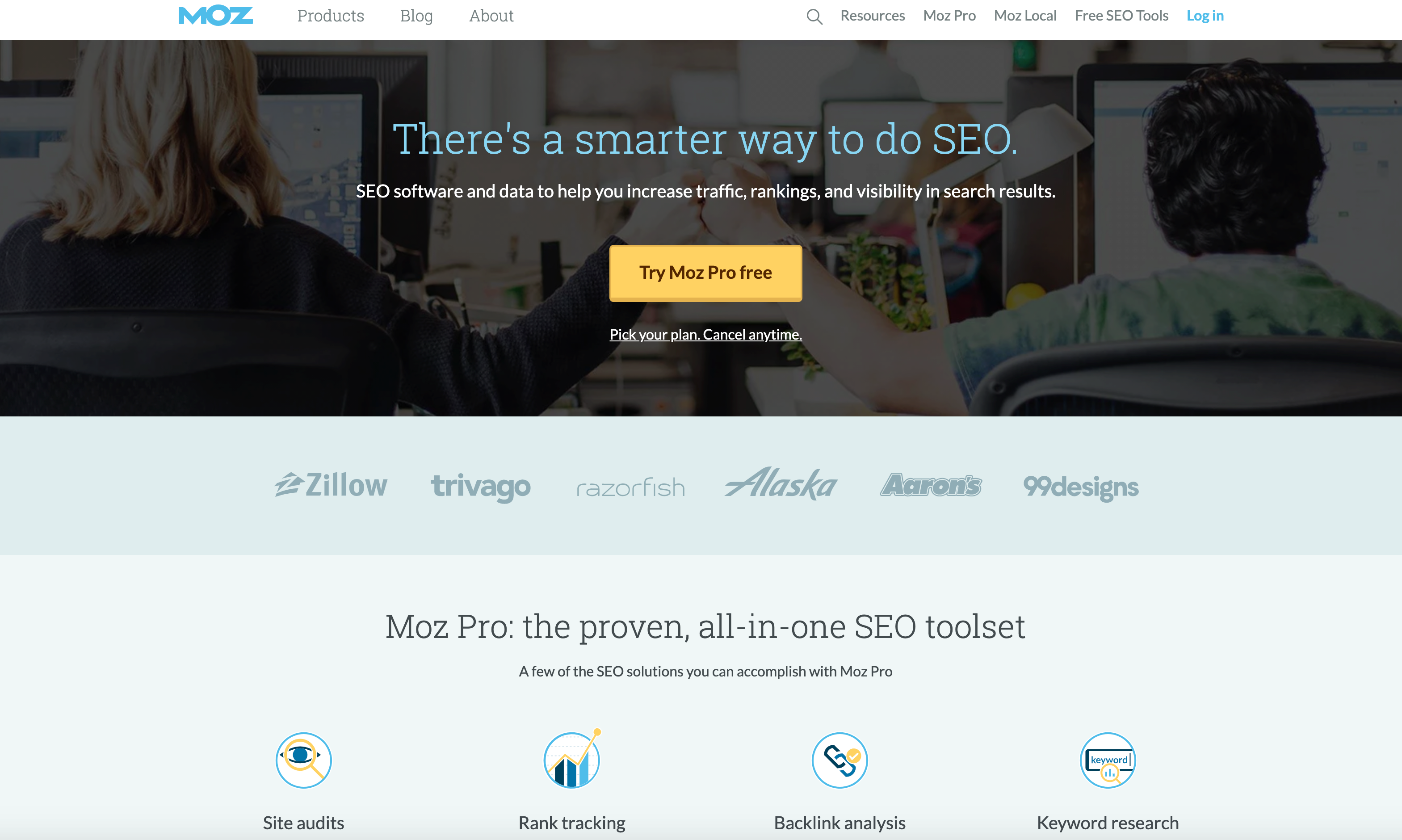
Moz Pro, an SEO app, keeps coming up as one of the best SEO tools that professionals actually use. Despite Google's daily algorithm updates, Moz was still up to date, according to some experts. Others praised Moz's chat portal, which they said helps them to always get a thoughtful answer to any query they have. Moz is a full-service powerhouse that can provide you with keyword tips or a web crawl. You will learn a lot about how well your website is doing as well as how to improve it. You can also download the free MozBar toolbar to see your website's metrics when browsing any link. If you're interested in learning more about SEO, Moz is a good place to start.
The go-to SEO tool for Keri Lindenmuth, Marketing Manager at Kyle David Group, is none other than Moz Pro. “My favorite feature of the tool is its 'page optimization feature,'” she says. It outlines the specific steps you should take to boost the SEO of each and every page on your website. It could say things like, "Include your keyword in this page title" or "Add a picture with a keyword alt tag." Simply by providing enhanced accountability, this tool has significantly improved our client's sector. We may equate the traffic and optimization of their site to that of their competitors. We should look at which pages and search words their rivals rank well for and adjust our web practices to compete with them. SEO becomes a guessing game without a method like Moz. You have no idea where you excel and where you could use some work.”
6. Ubersuggest: Keyword Tracking Tool
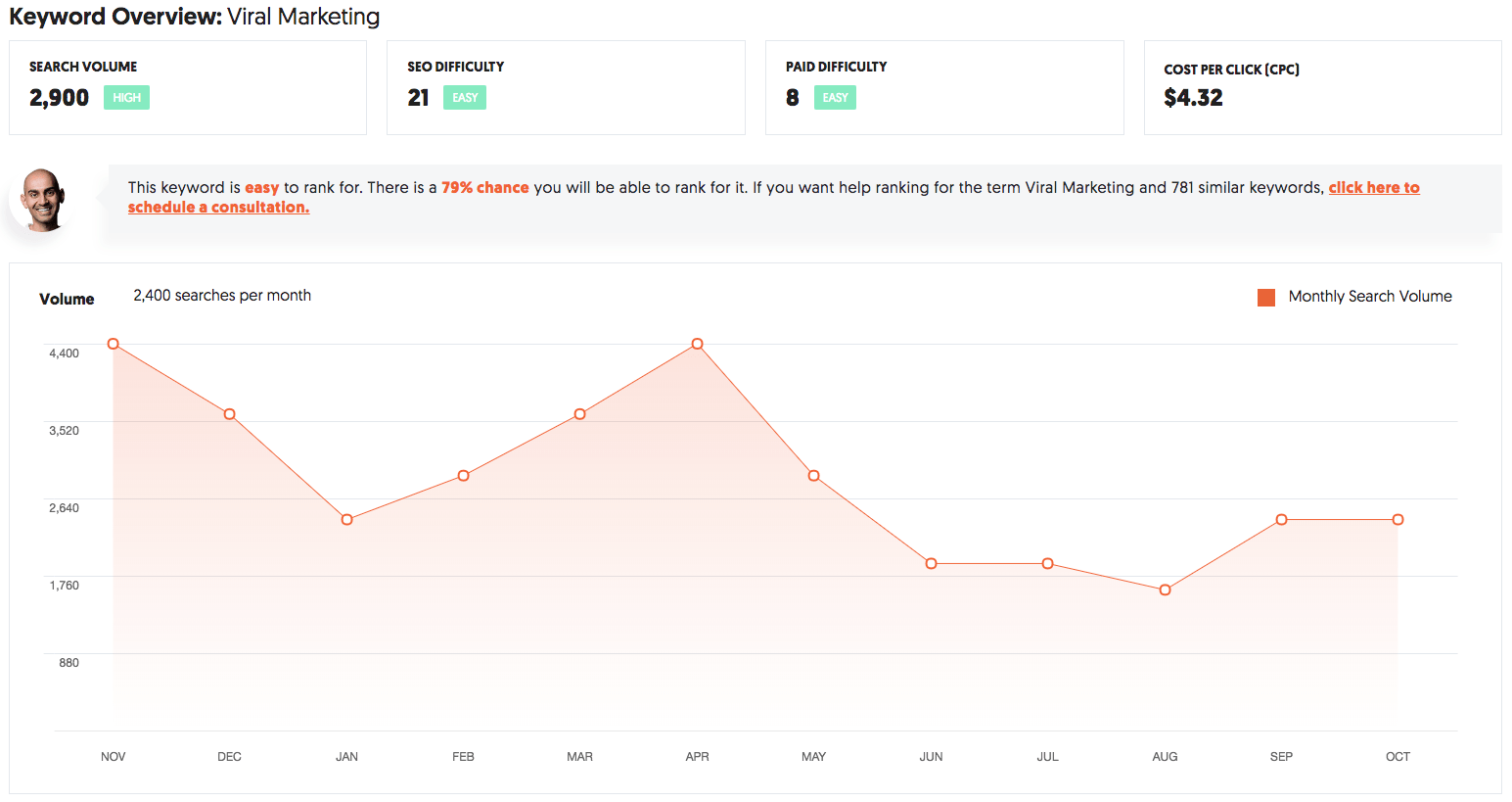
Ubersuggest is a free keyword finder tool created by Neil Patel that helps you recognize keywords as well as the search purpose behind them by displaying the top ranking SERPs. With hundreds of tips from this free great keyword app, you will find the right words to use on your website, from short to long-tail phrases. Keyword length, rivalry, CPC, and seasonal patterns are among the metrics Ubersuggest uses in its reports. This tool will help you decide whether a keyword is worth targeting and how competitive it is for both organic SEO and paid PPC.
7. SpyFu: Free SEO Tools

Though SpyFu's premium edition is fantastic, many of our experts praised its free features. If you're just getting started, you can easily progress to the paid features as your business grows. You can easily see how many times a keyword is searched each month and determine how difficult it is to rank for that keyword. You should also look at the rivals' keywords and see which ones they use. You can also use Google Ads to search your competitor's or your own website to see how many organic keywords they have, how many monthly clicks they receive, who their paid and organic rivals are, and what Google Ads promotions they're running. It’s one of the most detailed SEO analysis tools on the market.
Sparq Designs' Senior Project Manager, Adele Stewart, can't get enough of the SEO tech SpyFu. “I've used SEMrush and Agency Analytics in the past, but SpyFu outperforms my client's competitors,” she says. SpyFu has a lot of cool features, but my personal favorite is the SEO Research feature. You can enter a competitor's domain and get details about their SEO strategy. You may compare how much they pay for keywords with how well they rank organically, study their core keywords, and even evaluate their keyword classes. My client's SEO growth has been largely due to the use of SpyFu. There's a lot more to track and report on, and I don't have to put in nearly as much time researching as I did with previous SEO apps. SpyFu gathers the information I need and organizes reports in a way that is appealing to my clients. I've also seen improvements in indexing and ranking for keywords we hadn't considered.”
8. Woorank: SEO Ranking Tool
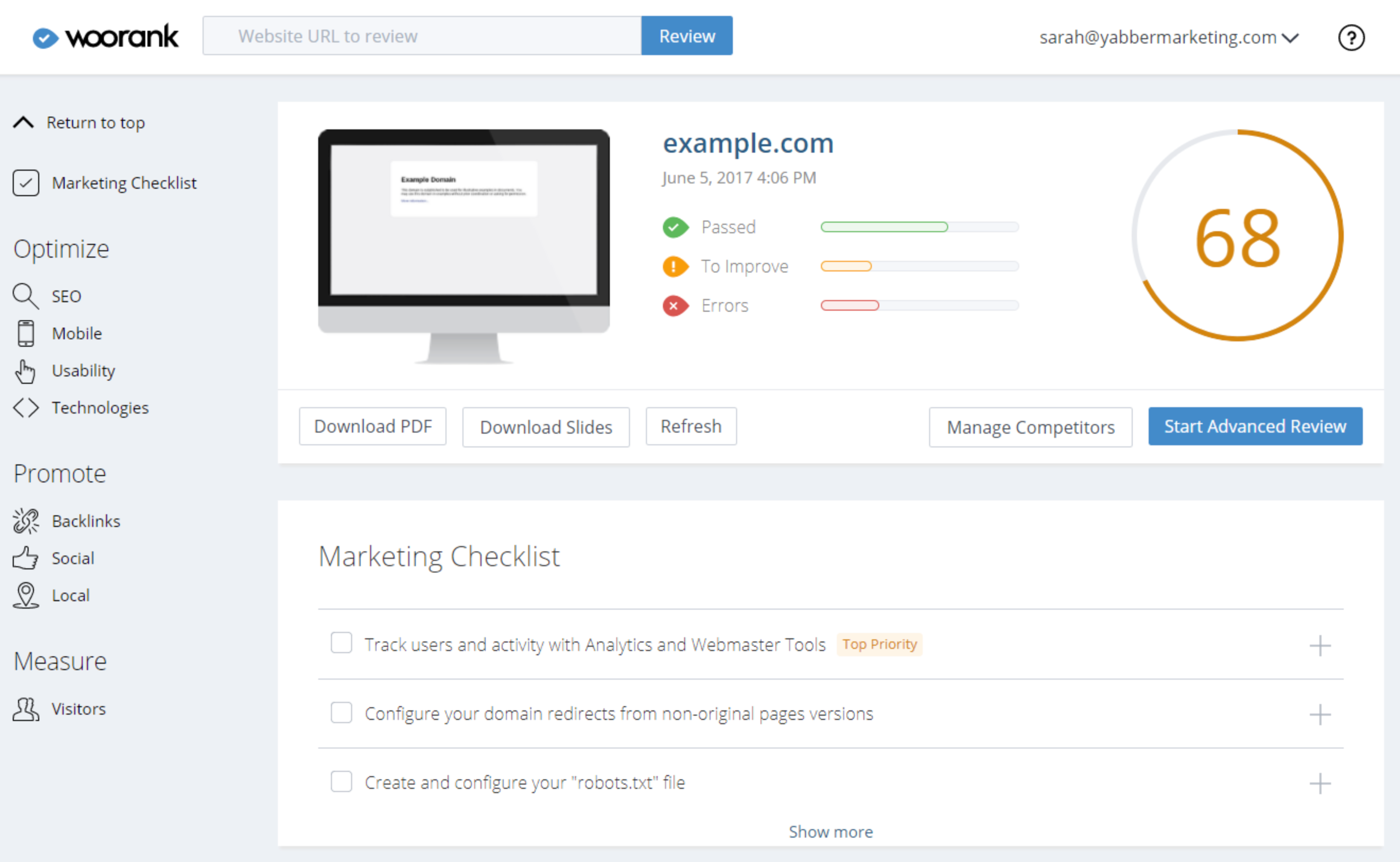
Woorank, a leading SEO analysis platform, provides both free and paid options for tracking and reporting marketing data. You can type in your competitors' names and see which keywords they're after so you can target the same ones. To optimize for users and search engines in the best way possible, try to understand how keywords behave over time. Most importantly, consider what your website is missing in terms of both technological and material. Woorank will assist you in identifying duplicate material, downtime, and security problems, as well as providing recommendations on how to resolve them.
9. Majestic: Marketing SEO Tools

According to experts, Majestic is one of the best marketing SEO methods. It has a plethora of useful features, such as The Majestic Million, which displays the ranking of the top million websites. Is your website one of those that made the cut? The Site Explorer feature gives you a quick overview of your site as well as the number of backlinks it has. It can also be used as an SEO keyword tool to find the best keywords to target, with features such as site comparisons and rank tracking.
The SEO tool Majestic is recommended by Ryan Scollon, SEO Consultant at RyanScollon.co.uk. “My favorite SEO tool is Majestic, which allows you to search the backlinks of a website that you specify,” he says. My favorite feature is the ability to compare a variety of SEO metrics such as confidence flow, referring domain count, and external backlinks count by including your own client's site and a bunch of competitors. It not only assists us in comprehending the [client's optimization] flaws, but it also includes a clear table that we share with our clients so that they can comprehend the issues and how they compare to their competitors. We often use Majestic to audit competitors' backlinks in the hopes of uncovering a few quick wins before moving on to other link-building strategies.”
10. Google Trends: SEO Checker Tool
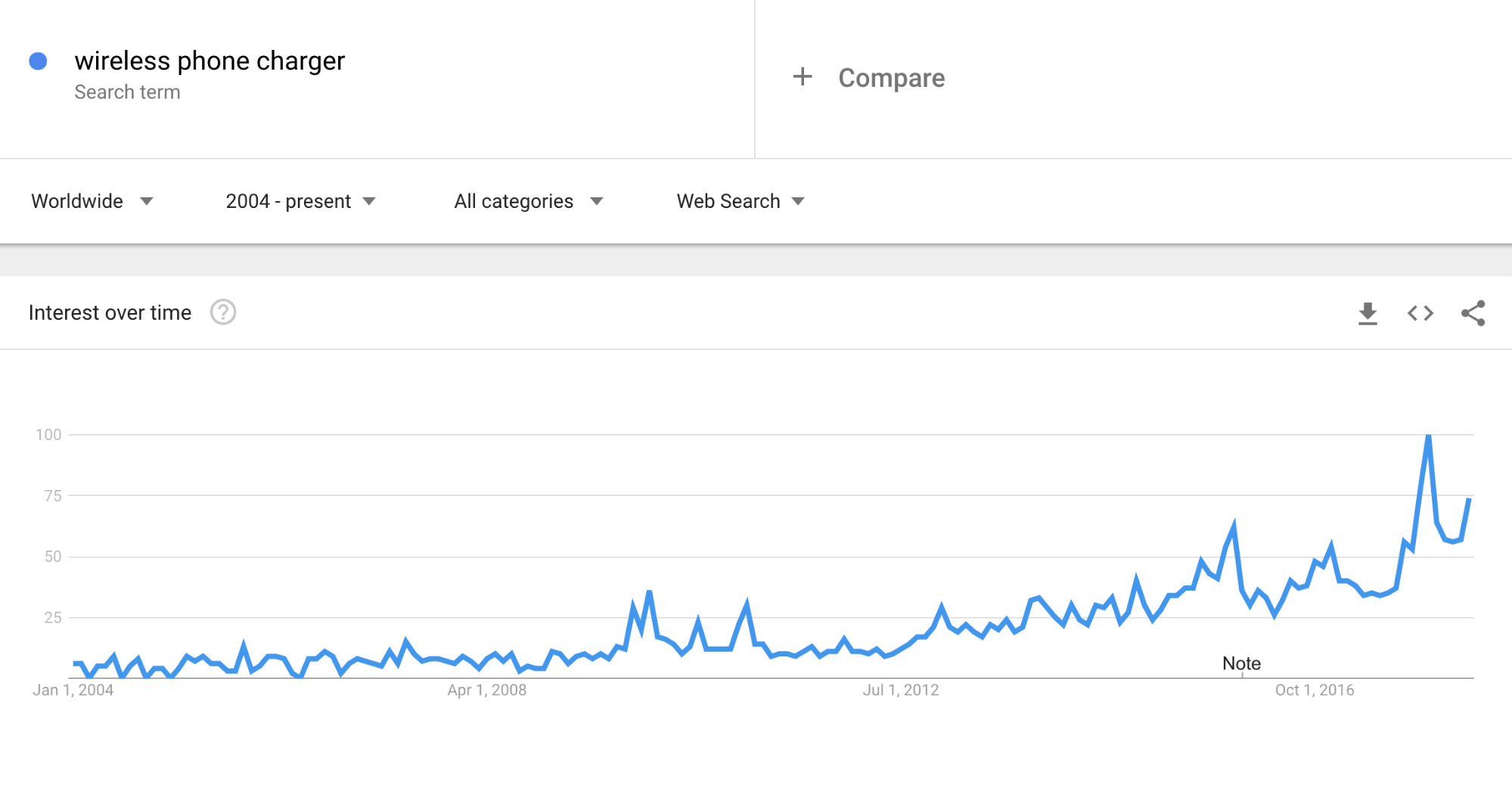
Google Trends has been available for a long time but is seldom used. It not only provides knowledge about a keyword, but it also provides valuable insight into the topic's trends, which can be useful at any point of a company's growth. Search for keywords in every country to get information about them, such as top queries, rising queries, interest over time, and geographical locations based on interest. This is the best SEO tool to use if you're not sure which patterns are right for you.
11. SEOQuake: Free SEO Tools
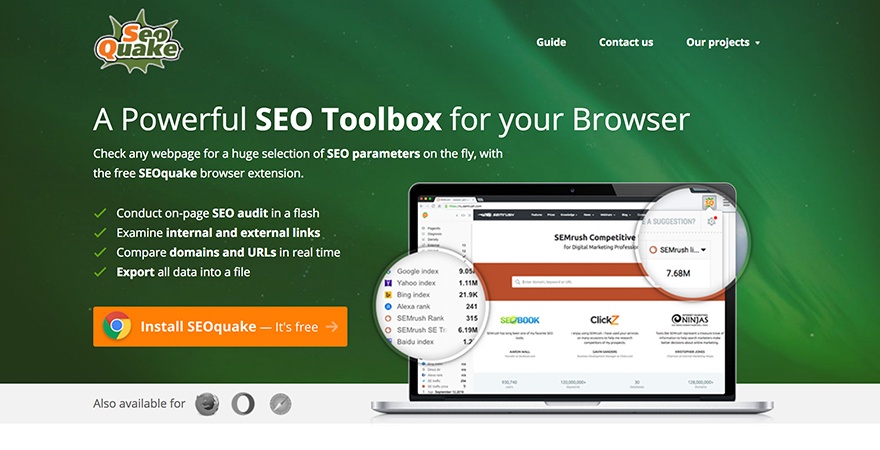
SEOQuake is widely regarded as one of the best free SEO resources available. This Chrome extension is an SEO checker that conducts on-page site audits, evaluates both internal and external connections, and performs website comparisons to see how you compare to your competitors. Keyword analysis, such as keyword density, an easy-to-read SEO dashboard, and an export feature that allows you to quickly download and submit data to key members of your team are among the other features of this SEO analysis tool.
Brin Chartier, a digital marketer and SEO content developer, is a big fan of SEOQuake, a free SEO tool. “I enjoy a strong browser extension, and SEOquake is the best free SEO tool for instant SEO metrics on any website or SERP,” she explains. I can perform an on-page SEO audit for myself or competitors in a matter of seconds, and the SERP overlay function is a fantastic visual representation of key page metrics that I can export to CSV and share with my team. This tool saves me hours of manual labor, which I can put to better use by making SEO-optimized content.”
12. Siteliner: SEO Analysis Tool
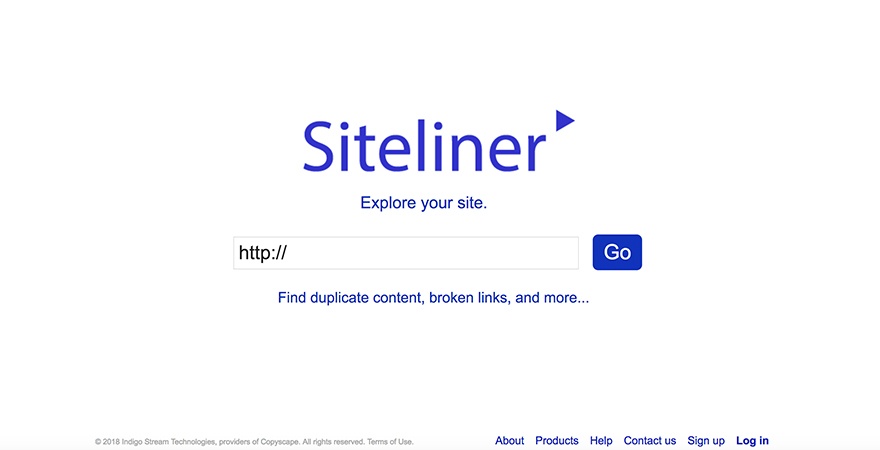
Siteliner is a duplicate content checker tool that can help you locate duplicate content on your website. What is duplicate material, exactly? Content that is identical to that found on other websites. Google punishes websites that use it. You can search your entire website with SEO tools like this one to look for duplicate content, broken links, average page size and speed, the number of internal links per page, and more. It also compares your website to the average of all websites that have been reviewed with this method, so you can see where you are.
The SEO tool Siteliner is recommended by Tieece Gordon, a Search Engine Marketer at Kumo Digital. “Whenever I'm faced with a new site, Siteliner is one of my go-to SEO tools,” he says. If done correctly, identifying and resolving potential issues increases quality and value, prevents cannibalization, and brings more meaning to a particular website, which is the whole point of using this method. There can be no complaints about a free (paid version with more features) tool that allows you to search duplicate levels, broken links, and the reasons some pages were missed (robots, no-index, etc.).The Duplicate Content table is the main feature here that Siteliner does better than any other I've seen. It displays URLs, match terms, percentages, and pages in a simple and intuitive manner. Since it's smart enough to ignore pages with no-index tags, it's a safe bet that the vast majority of the pages with a high number of no-index tags will need to be dealt with. I've seen a lot of eCommerce sites that focus on manufacturer descriptions, service sites that want to hit different places with the same text, and sites with only thin pages – and often a mix of these. I've seen rankings rise as a result of adding valuable and exclusive content, and as a result, sessions and conversions have increased for my clients. All of this has stemmed from Siteliner. It may not be the enterprise-level, all-singing, all-dancing software that promises the world, but its simplicity is perfect.”
13. Fat Rank: SEO Tools
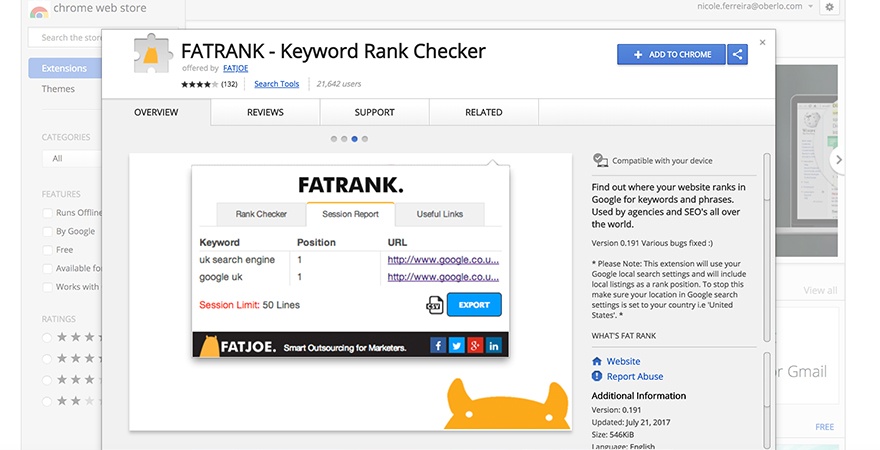
SEO (Search Engine Optimization) is a Fat Rank, a Chrome extension makes it simple to evaluate the success of your website. This SEO keyword tool will tell you how well your keywords are doing. You can use keywords to narrow down your quest and see your rank per page for each keyword you optimized for. It will warn you that you aren't ranking for that keyword if you aren't in the top 100 results. This data enables you to better configure your website for that keyword and make necessary changes.
Blake Aylott, an SEO expert at Project Build Construction, has a favorite free SEO tool that few people are aware of. “Fatrank is the name of the SEO tool. It's a Chrome extension that displays the rank for any search query you type as well as a URL when you're on that URL. I may simply type in a keyword to see how I am currently ranked for it. It's very reliable and up to date. When clients want to know their current rating for something, the tool is a lifesaver because I can tell them with 100 percent accuracy. Fat Rank is a free tool that should be in every SEO's toolbox.”
14. Keywords Everywhere: SEO Keyword Tool
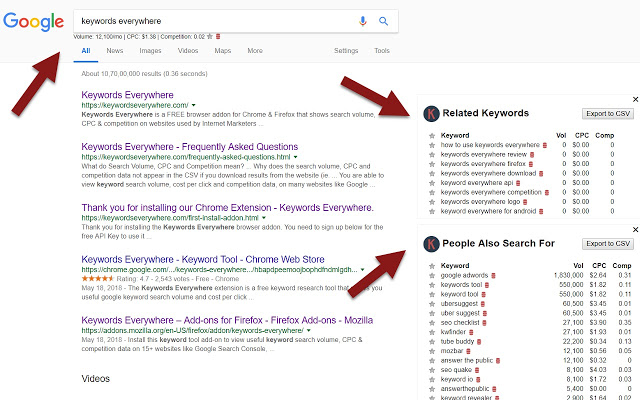
Another great SEO Chrome extension is Keywords Everywhere, which gathers data from various SEO tools such as Google Analytics, Search Console, Google Trends, and more to help you find the best keywords to rank for. These free SEO tools make determining the best keywords for your website much easier. Rather than clicking through multiple websites per day, you can save a lot of time by using this one method.
Get Found Madison's Eagan Heath is a big fan of the SEO tool Keywords Anywhere Chrome extension. “It helps both me and my clients to see monthly U.S. keyword search volume right on Google, which is perfect for coming up with blog topic ideas,” he says. It also helps you to bulk upload keyword lists and view data that Google now hides behind huge ranges unless you pay for Google Ads. “Amazing value for a free tool!”
15. Screaming Frog: SEO Tools Online
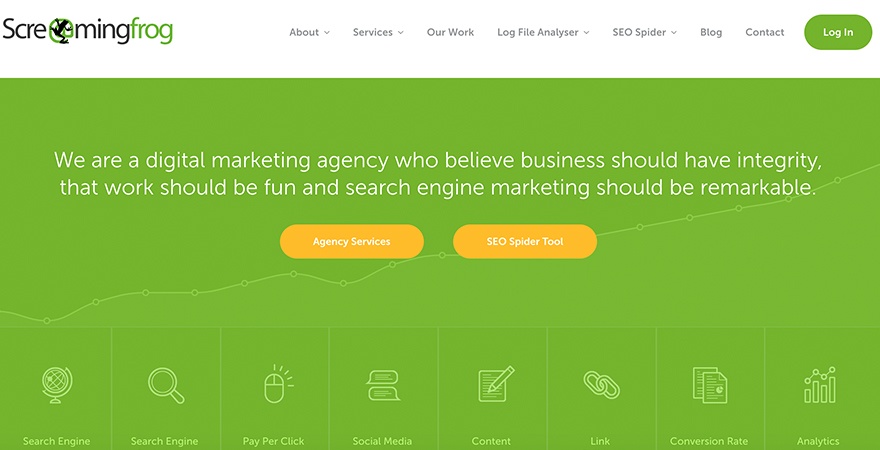
Ribbit, Ribbit Experts consider Screaming Frog to be one of the best SEO resources available online. They appreciate how much time they save by using this method to conduct site audits because it analyzes the website so quickly. In reality, everyone we spoke with said that Screaming Frog provides insights faster than most SEO resources available online. This tool also alerts you to duplicate content, errors that need to be fixed, bad redirections, and places where link building could be improved. Top SEO experts rated their SEO Spider tool as the best feature.
The SEO tool Screaming Frog is a favorite of Jon Hoffer, Director of Content at Fractl. “I wouldn't be able to do my job without it,” he says. It allows me to crawl client and competitor websites in order to get a broad picture of what's going on. In one spot, I can check for 404 errors, find word counts, get a list of all title tags and H1s, and access analytics info. At first glance, I can see where fast changes could be made and which pages are generating traffic. It's all there if meta descriptions are incomplete, title tags are duplicated around the web, or someone inadvertently non-indexed any pages. I really enjoy being able to extract specific data from sites. I was recently working on a directory and wanted to know how many listings were on each page. With Screaming Frog, I was able to pull the data and compare it to analytics data. It's useful to know what the rivals have on their websites. This is a fantastic resource for content ideas. Overall, Screaming Frog allows me to conduct a fast audit and gain a better understanding of what's going on. It shows potential for quick wins as well as useful information.I can determine if site migrations went off without a hitch; they usually don’t. With the inclusion of traffic data, I’m also able to prioritize tasks.”
16. Serpstat: All-in-one SEO platform

Serpstat is a growth-hacking tool that helps you achieve your SEO, PPC, and content marketing objectives. Serpstat would be a great option if you're looking for an inexpensive all-in-one platform to solve SEO tasks, evaluate rivals, and manage your squad. Many analysts are already using the tool since it has keyword and competitor research data for all of Google's global regions. Serpstat is also well-known for its impressive features. The most famous is a feature called Missing Keywords, which shows you which keywords your rivals are ranking for in the top 10 search results but you aren't.
“I've used a lot of keyword research and analysis tools in the years I've been working in digital marketing, and a lot of them have become very lossy and tried to diversify into various items, losing emphasis on what people primarily use the tool for,” says Dan Taylor, Senior Technical SEO Consultant & Account Director at SALT.agency, who switched to Serpstat after trying other tools: “I've used a lot of keyword research and analysis tools in the years I've been working in digital marketing Serpstat is an excellent tool for conducting analysis, tracking results, and monitoring numerous data points. It's also user-friendly, and the fact that the third-tier package supports multi-user is a game-changer. To summarize, Serpstat is a fantastic addition to our toolkit and a very capable, low-cost alternative, and less lossy alternative to other popular platforms.”
17. Bonus Tool: Incognito
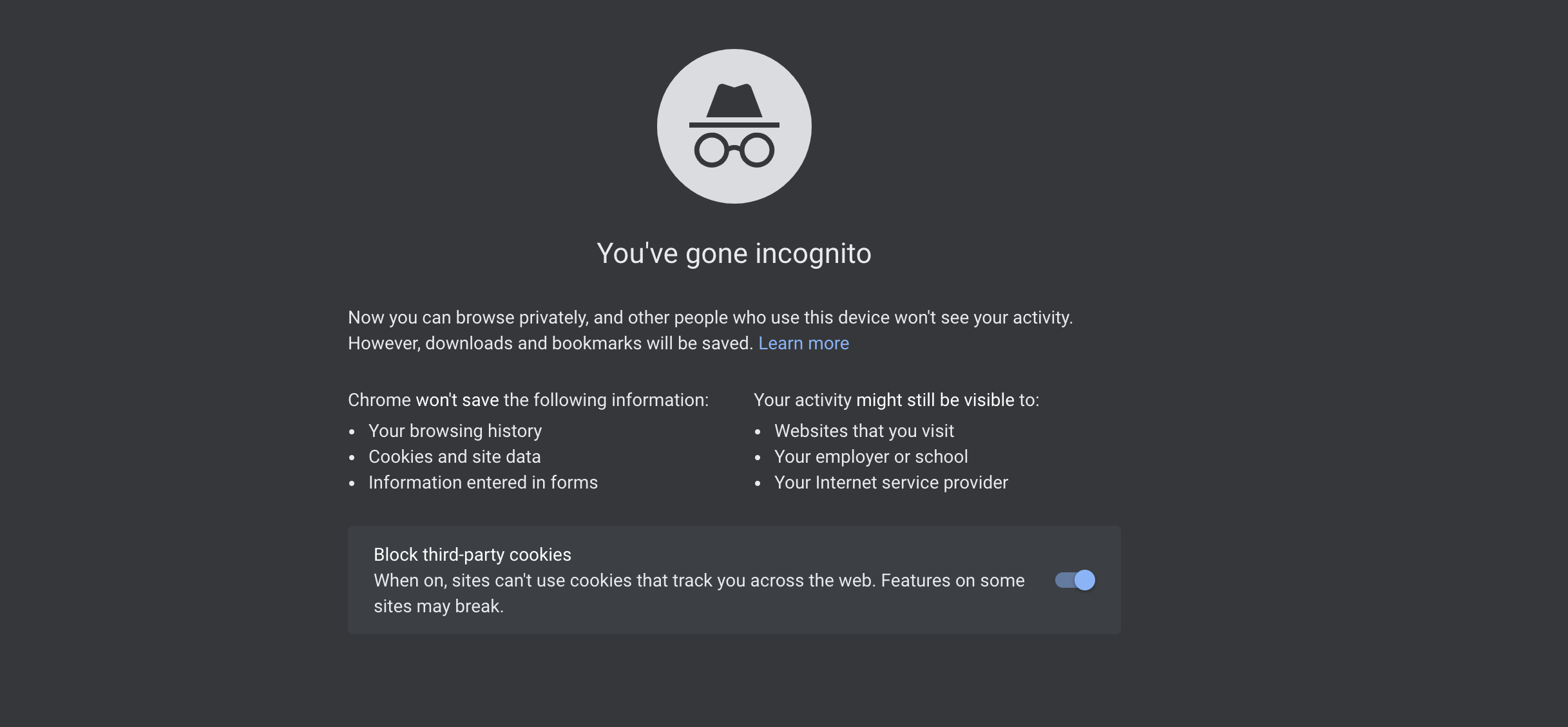
Switching to Incognito mode and conducting Google searches will provide you with unbiased, "clean" searches that will help you understand what your users see and get when searching for keywords. When you use the autofill options, you will be presented with suggestions for semantic keywords to use. Searching in Incognito is one of the best free SEO tools because it shows you where you really rank on a results page for a specific keyword.
Conclusion
The best SEO resources on this list are worth their weight in gold. They provide you with insights that would otherwise take a long time to come up with. To be sure, you'll have to put in the effort to see the results you need. That means creating SEO-friendly content, rewriting all of your product descriptions, and making changes based on what you've learned from these SEO resources. Some of these tools have free features or trials that you can try out if you're on a budget. Take a look at them. Let it happen. Find out what you need to do to boost your SERP ranking. And, to skyrocket your progress, follow the tool's recommendations. It is up to you to be successful. Take the next logical move.

